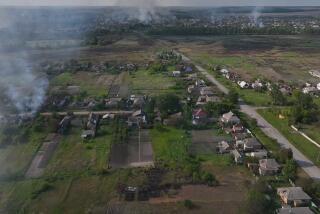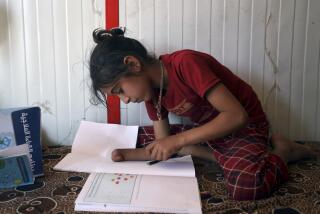Yugoslav City Battling Toxic Enemies
- Share via
PANCEVO, Yugoslavia — They call it “The Night of the Witches,” those horrible hours that began at precisely 1 a.m. April 18, when NATO bombs and missiles rained in force on this Serbian city. Within seconds, they demolished a refinery, a fertilizer plant and an American-built petrochemical complex that released a toxic cloud so dense and potentially lethal that its effects can be felt here even today--and will be, perhaps, for decades.
The sun never shone here on the morning after, according to detailed municipal health department logs and video footage.
A thick, grayish-white fog containing concentrations of carcinogenic vinyl chloride monomer that were 10,600 times above human-safety limits had settled over the city at dawn and finally cleared at nightfall on a day of horror that the townsfolk have named for the Serbian equivalent of Halloween.
But Monday, nearly three months after NATO’s devastating attack on Pancevo--and almost a month after it dropped the last bomb of its air war on Yugoslavia--here’s a glimpse of the enduring environmental and human nightmare the alliance left behind:
* Physicians in this city 10 miles northeast of the Yugoslav and Serbian capital, Belgrade, have privately recommended that all women who were in town that night avoid pregnancy for at least the next two years. Women who were less than nine weeks pregnant in mid-April were advised to obtain abortions, and doctors say most have complied.
* The canal leading from Pancevo’s South Zone Industrial Complex is still awash with vinyl chloride, even after much of the 100 tons of cancer-causing chemical released from the Petro Hemija factory that night already has mixed into the waters, the riverbed and most likely the food chain of the mighty Danube River just downstream.
* And still, the ground in and around Pancevo is saturated with ammonia, mercury, naphtha, acids, dioxins and other toxins that leaked and burned out of the factories that night, raising yet-unanswered questions about the long-term impact on a city struggling to survive day to day.
“Only in the next two years or 20 can I tell you what the full consequences of that night will be,” Pancevo’s pro-democracy mayor, Srdjan Mikovic, said Monday.
“I’m afraid you will find a lot of our people in the oncology ward fighting cancer, or perhaps in the hematology department or centers for respiratory diseases, or perhaps in the morgue. But for today, it’s enough to worry just how to get through the summer and the cold winter that lies ahead,” Mikovic said.
Although perhaps the most dramatic, Pancevo is one of many environmental disasters that are legacies of NATO’s war on Yugoslavia and its dominant republic, Serbia--78 days of aerial assaults on power plants, factories, fuel refineries and storage tanks. The alliance said these attacks were intended to degrade Yugoslav President Slobodan Milosevic’s regime and war machine.
On Monday, the phones still were ringing wildly in Dr. Slobodan Tosovic’s office at Belgrade’s Public Institute of Health, where the chief ecotoxicologist was fielding questions and complaints from throughout this war-damaged land.
Municipal officials in the opposition-ruled town of Kragujevac to the south were begging for permission to flush out a lagoon poisoned by PCBs, which were released from a power plant that NATO bombed there toward the end of the war.
Officials phoned in from the opposition-led city of Novi Sad in the north, appealing for the federal government to speed up its study of their underground water reservoir--an ongoing effort, Tosovic said, to determine whether PCBs or other poisons had polluted the city’s entire drinking-water supply.
“It’s enough to make me believe the Americans and NATO were making a biochemical experiment with us,” said Tosovic, who wrote a paper during the war titled “Aggression on Yugoslavia: Indirect Chemical Warfare.”
But Monday, Tosovic downplayed the short-term toxic impact of the war.
“The fact is, we were quite lucky,” he said. “We have the capacity to clean up the channel in Pancevo, and already we’ve cleaned up the worst-hit areas of the Danube and other rivers. There are no lasting air pollution problems. And last week, we lifted the fishing ban on the Danube.”
The Serbian Health Ministry, which includes Tosovic’s department, also has issued an urgent advisory to physicians, urging them to stop recommending abortions and birth control--an issue with broad political and sociological implications in a nation where 10 years of war-induced poverty among delicately balanced ethnic groups already have sent Serbian birthrates plunging.
“We begged these women not to stop their pregnancies because we didn’t want a biological war on top of a chemical one,” Tosovic said.
Initial tests of crops and farm animals, he asserted, have shown only marginal levels of toxicity, although he cautioned that ongoing DNA testing of seeds and embryos to determine the longer-term genetic impact of dioxins and other pollutants on the food chain will not be completed until this fall.
But Tosovic and other Yugoslav scientists acknowledge that some of the greatest environmental effects may have yet to be felt.
Facing a winter in which heat and electricity will be in short supply in a nation where most power plants and oil refineries were crippled, many of Yugoslavia’s 10 million people are scraping together what little money they have to buy stoves that burn wood. And the demand for that fuel, the scientists say, will threaten Serbia’s forests and national parks, which already have been emptied of several endangered species that fled during the war.
“Everyone here is buying a Smederevac,” said Nena Simendic, news editor of Pancevo’s opposition-run local television station, citing the name of Yugoslavia’s most popular wood-burning stove.
“Of course, it’s going to ruin the environment even more, but who here has the luxury to worry about that?” she said. “For us, it’s survival--in the here and now.”
For Simendic and her mayor, who fiercely guarded the independent voice of TV Pancevo throughout the NATO war, the fact that this town may have suffered some of the longest-term damage of the U.S.-led air war represents far more than a single irony.
First, Mayor Mikovic produced municipal records documenting that the petrochemical plant that opened in 1978 was built by three American companies and a German firm. Two other U.S. corporations, along with a French concern, built the oil refinery. And the fertilizer plant was a joint venture by the U.S., Spain and the Netherlands.
“The Americans built that factory, so they knew precisely what was inside when they bombed it,” Mikovic said of the petrochemical plant where a NATO bomb ripped apart the storage sphere containing the vinyl chloride monomer--a raw material for plastic products.
Then there was Pancevo’s political and philosophical past. It was just a year ago, Mikovic recalled, at a time when the North Atlantic Treaty Organization already was threatening to bomb Yugoslavia, that the city hosted an international women’s water polo tournament that the American team won.
“You should have heard the crowd cheer when they raised the American flag and played your national anthem,” Mikovic told a visiting American on Monday.
And historically, Pancevo has been one of Serbia’s fiercest bastions of anti-Milosevic activism--right in the backyard of the nation’s capital, the center of the Yugoslav president’s regime.
“It is very difficult now to explain to my people why Pancevo should have been so victimized by this war,” Mikovic said. “And I don’t think the people here will applaud the American flag again for some time to come.”
A handful of private, nonprofit Western aid agencies concerned about Yugoslavia’s postwar environment already have visited Pancevo and other heavily bombed Yugoslav cities and towns in recent weeks, and a multinational, nongovernmental conference on the issue is scheduled to take place in Belgrade on July 15.
“But if the Western countries and their private investment do not open now to these opposition towns they bombed throughout Serbia,” the mayor said, “Mr. Milosevic and his Socialist Party of Serbia will be able to keep saying the whole world is against us. And that, I’m afraid, will make them stronger.
“I’m speaking personally now. I have many cousins in the United States. My sister is now in Los Angeles. We have had so many connections with America through the years. And now, we have been left like this, feeling utterly alone.”
Asked about his concerns for his own health after 11 weeks of visiting the sites of each NATO strike in Pancevo and of living under the vinyl-chloride cloud for an entire day, Mikovic shrugged.
“Living through this war,” he said, “has taught me to believe in destiny.”
Simendic, who covered the city’s environmental disaster for her TV station April 18 and throughout the war, was even less sanguine.
“First, we have to rid ourselves of Milosevic,” she said, “and then we can worry about everything else we’ve got.”
More to Read
Sign up for Essential California
The most important California stories and recommendations in your inbox every morning.
You may occasionally receive promotional content from the Los Angeles Times.













